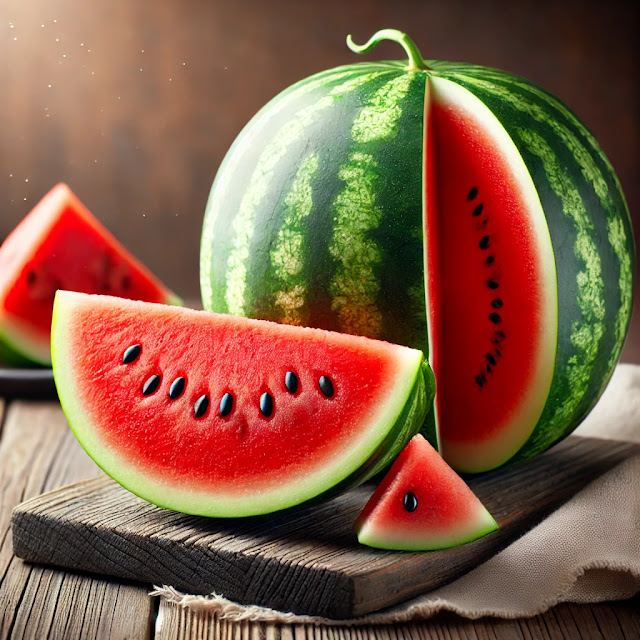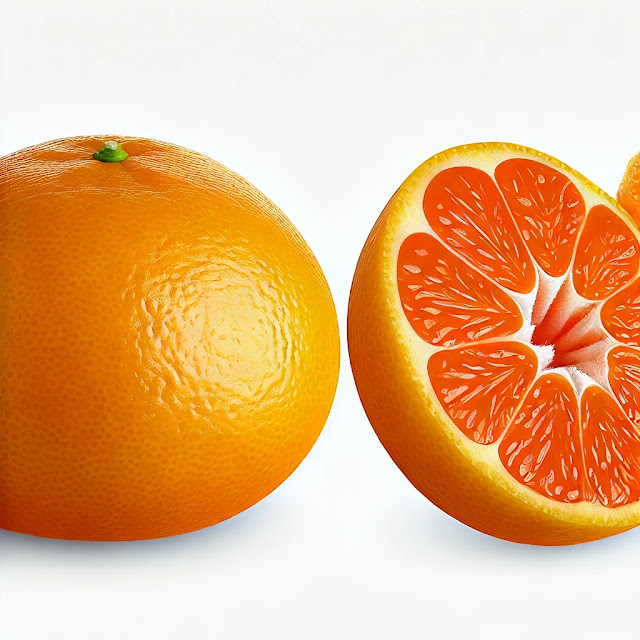Unlocking the Juicy Secrets of Watermelon: Benefits, Nutrition, and Fun Facts
Overview:
Watermelon, a summer favorite, is more than just a refreshing treat on a hot day. Known for its vibrant red flesh and sweet flavor, this fruit is packed with hydration and health benefits. Its high water content and natural sugars make it a perfect snack to beat the heat, while the bright green rind and juicy flesh make it a visual delight. Loved worldwide, watermelon is truly a universal symbol of summer fun and nourishment.
Calories and Key Nutrients (per 100g):
Watermelon contains just 30 calories per 100g, making it a low-calorie option for those watching their intake. It's rich in Vitamin C (10% of the daily value), Vitamin A, and potassium. Its primary component, water (about 92%), helps with hydration. Compared to fruits like bananas (89 calories per 100g), watermelon provides fewer calories but more hydration due to its water content, making it a great option for calorie-conscious individuals.
Health Benefits:
Watermelon is a powerhouse of lycopene, a powerful antioxidant also found in tomatoes. Lycopene has been linked to improved heart health and protection against certain types of cancers, particularly prostate cancer. The Vitamin A in watermelon supports eye health, while its potassium content helps regulate blood pressure. The high water content also aids in digestion and keeps the body hydrated, which can improve skin health and energy levels.
Proper Consumption Methods:
The best way to enjoy watermelon is fresh, but it can also be incorporated into various dishes. Adding a few slices to a fruit salad with mint or mixing it into smoothies can be both refreshing and nutritious. Freezing watermelon chunks and blending them into a slushie or adding them to salsas for a unique twist is another way to maximize its versatility.
Delicious Ways to Enjoy (Recipe):
For a creative twist, try a Watermelon Feta Salad. Simply dice watermelon into bite-sized pieces, toss with fresh mint leaves, crumbled feta cheese, and a drizzle of balsamic vinegar. The sweetness of the watermelon pairs perfectly with the salty feta, creating a balanced and refreshing summer dish.
Consumption Warnings:
While watermelon is generally safe to consume, eating it in excess can lead to digestive discomfort due to its high water and sugar content. Overconsumption may cause bloating or diarrhea, especially for those with sensitive stomachs. Additionally, people with diabetes should be mindful of portion sizes as watermelon has a relatively high glycemic index, which could impact blood sugar levels.
Comparison with Other Fruits:
Compared to fruits like pineapple or mango, watermelon offers more hydration but slightly fewer nutrients. Pineapples, for example, provide more Vitamin C, while mangoes are richer in Vitamin A. However, when it comes to calorie content and hydrating effects, watermelon wins hands down. It's an ideal snack for anyone needing to stay cool and hydrated without a calorie overload.
Who Should Eat and Who Should Avoid:
Watermelon is ideal for athletes and individuals engaged in outdoor activities due to its high water and potassium content, helping to replenish electrolytes. However, those with kidney problems or those on a low-potassium diet should be cautious about consuming too much, as the potassium in watermelon can affect kidney function.
Fun Facts:
Did you know that watermelons were first cultivated in ancient Egypt? Archaeologists have found watermelon seeds and paintings in ancient tombs, suggesting that they were a prized food for royalty. Additionally, all parts of the watermelon, including the rind and seeds, are edible. In some cultures, watermelon seeds are roasted as a snack, and the rind is often pickled.
Watermelon in Different Cultures:
In Japan, watermelons are sometimes grown into square shapes by placing them in boxes during their growth process, which makes them easier to stack and store. In China, watermelon is a traditional gift brought to a host during the summer, symbolizing good luck and prosperity. In the southern United States, watermelon is commonly served with salt to enhance its sweetness.
Research Findings on Watermelon:
Recent studies have shown that the citrulline in watermelon can improve athletic performance by reducing muscle soreness and improving blood circulation. This amino acid helps to widen blood vessels, allowing more oxygen to flow through the body, which could enhance endurance during exercise.
Additional Tips:
For an extra hydration boost, try blending watermelon with coconut water for a refreshing post-workout drink. Additionally, watermelon can be used in skincare – its high water content and natural vitamins can help to moisturize and refresh the skin when applied topically.











Comments
Post a Comment